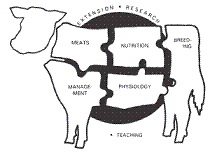Animal Science, Department of

Nebraska Beef Cattle Reports
Date of this Version
2022
Citation
2022 Nebraska Beef Cattle Report
UNL Beef, Institute of Agriculture and Natural Resources, University of Nebraska-Lincoln
Abstract
Inflammation during heat stress may mediate poor growth in livestock. The effects of anti-imflammatory treatments on muscle growth during chronic heat stress were evaluated by using meat lambs as a smaller cheaper model for feedlot steers. Wethers were maintained in normal (75oF) or heat stress (105oF for 12 hours/day, 85oF for 12 hours/day) environments for 30 days and received dexamethasone injections every 3 days, oral fish oil supplementation twice daily, or no intervention. Growth was tracked and muscles were weighed when harvested afterward. Dexamethasone and fish oil both increased average daily gain over the final 15 days of the study despite no difference in feed intakes. In general, heat stress reduced muscle weights. Dexamethasone recovered size deficits caused by heat stress for many but not all muscles. Fish oil supplementation also rescued size in some muscles but was less profound than dexamethasone. Nevertheless, these results show that targeting inflammation may be key to improving muscle growth in heat-stressed livestock.
Included in
Large or Food Animal and Equine Medicine Commons, Meat Science Commons, Veterinary Preventive Medicine, Epidemiology, and Public Health Commons

